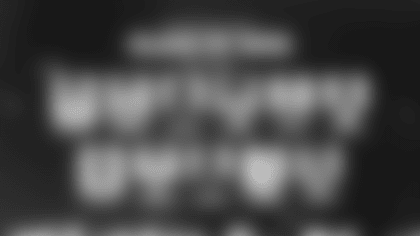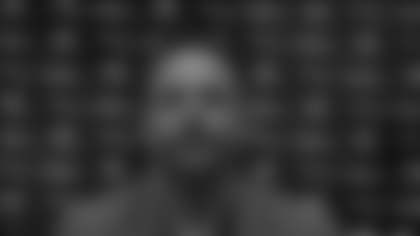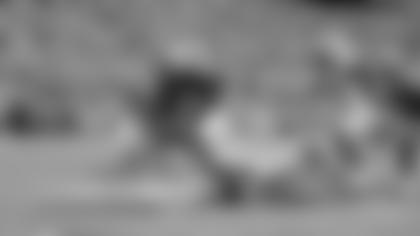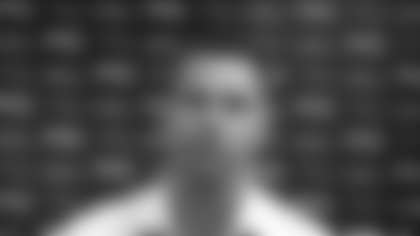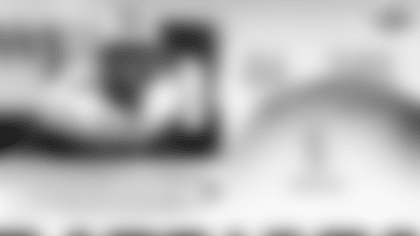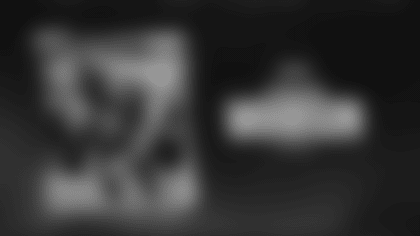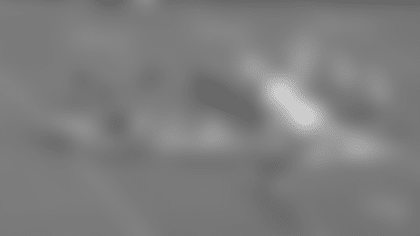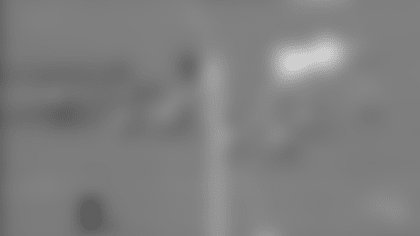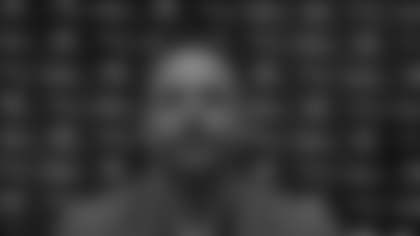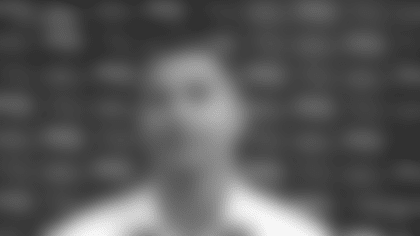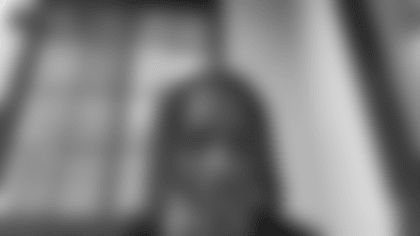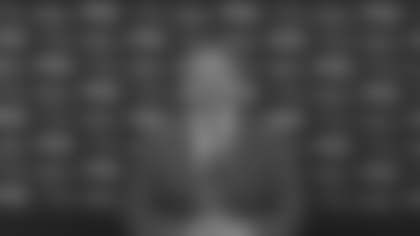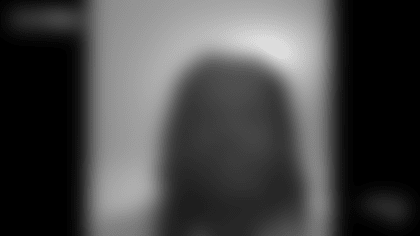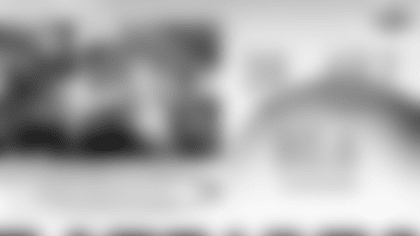DB JONATHAN JONES
VIDEO CONFERENCE
May 19, 2020
Q: What have you learned over the course of your career from the leadership in the defensive backfield from players like Devin and Jason McCourty, Patrick Chung, Stephon Gilmore and others?
JJ: I've been able to learn a lot. I think, like you said, you speak on the mentorship from Devin and the older guys like that. It's impacted my career so much because they're always willing to help the young guys and just that transition year after year, coming into a place like New England, which is not easy to play for. Having those veterans who have done it and have done it at an elite level, it's just some easy footsteps to follow.
Q: What have the virtual meetings been like?
JJ: It's been fun. It's definitely been a change up to just the closest we have to get the camaraderie of a group. The rookies just joined in with us, so just having that camaraderie, everyone getting to talk and spend time with each other. It's a little different, but as with everything, you learn to adapt and it's been fun to just get back with the guys and have the jokes going back and forth across the meetings, as well as getting back to talking ball at an elite level with the coaches and everyone.
Q: Did the rookies join in this week?
JJ: Yeah, I think the rookies, they started, and like I said, the whole team is getting together. Just having everyone in the meetings, day-in and day-out, and getting to finally be around each other kind of brings out that side of football. You know, we're not there in the facilities, obviously, to interact with each other, but the virtual meetings have been just that.
Q: Coaches and players around the league have mentioned that virtual meetings allow for more individual stuff that you wouldn't normally get in the offseason program. Have you felt that all? Also, how are you staying in shape? Would you be ready if they threw you on the field tomorrow to do what you'd normally be doing mid-May?
JJ: Definitely. I'll start with that as far as the conditioning part. We're staying on our routine of trying to maintain our normal workouts. I would say the lack of competition that we kind of get when we start – we haven't really gotten to that phase where we'd be at, but we're starting to get there as far as timing when we're going against the offense in live situations. So, I think that's kind of the only thing that's missing. But, as far as workouts and conditioning, we're doing the same regimen we'd be doing while we're there. I really don't think that's changed much. Like I said, I think the live work that we'd be getting going into the phase two in the OTAs is kind of what you're going to miss the most.
Q: What are the goals of the virtual meetings? What are you guys learning and what's going on in these meetings?
JJ: Mental. I think it's to have everyone on the same mental plane as far as communication, refreshing that – I mean, even for the veteran guys, just hearing some of those terminologies over and over again – and starting from scratch. I think that's something we kind of do every year. We don't assume that everyone knows anything, so we start on the playbook from page one. So, having these meetings and being able to start from page one of the playbook and go through that, as veterans its refreshers and young guys, it's to catch them up to where everyone else is. So, I think the communication of that is so key. Like I said, we're missing the physical aspect of it, but just having that communication has been key.
Q: In terms of the physical aspect, do you have a home gym or have you been working out outside?
JJ: I had to assemble my own gym. That was fun. We had to get it together and get everything in. Coaches kind of have a workout they send us and have all your equipment that you're going to need, so got all that in and just being able to get the workouts, get them in, and like I said, stay on them, stay in shape and stay the course.
Q: I want to take you back to the Wild Card game and the tackle you made against Derrick Henry. What is the mindset when you're taking on a guy with sizable power and speed like that?
JJ: He's a force. I mean, at that point, on defense we're always taught if you give us one yard to defend, it's our job to keep them out of the end zone. So, going through that play, it was a bang-bang play right there at the end zone and just to run through him. I'm definitely giving up a little bit when it comes to size, but just generate enough force to run through a guy that big – that's what helps.
Q: When you consider the level the defense played at last year, what can you do this year individually and as a secondary to perhaps reach an even higher level with most of the guys coming back?
JJ: That's a good question. I think, individually, it just starts with improvement. I think every guy kind of goes back to some of his plays that he didn't make or that he was close to making the year before and just finding a way, whether it's mentally or physically, to get closer to making those plays. As far as it goes as a unit, communicate everything. Communication, every aspect – nothing in life is 100 percent, but that's always our goal is to be 100 percent. So, just finding those areas that we have had in the past and trying to fix those. Like I said, we have a lot of veteran leadership and a lot of guys that are up to the task of just continuing to strive for perfection.
Q: You talked about individual improvement. Are you looking to get back in the interception column this season?
JJ: Definitely. Like I said, that's a big personal goal of mine this year is to help contribute on the team as far as more turnovers in that aspect. But, the whole team – I think the whole team, it starts up front, the secondary, just all working together as one group. That's what we have to start this year to get anywhere close to where we were last year. Like I said, it's a whole new year, a whole new defense, a whole new team. So, just figuring out who we are as a team and how we win best on defense is our task this year.
Q: There are several Auburn guys on the roster. What did you see from Jarrett Stidham last season when you went against him in practice? And what do you remember about Will Hastings? I think he was a kicker when you were a senior at Auburn. Are you surprised he's now a wide receiver on the same team?
JJ: I'll speak to Will first. I remember Will from my time at Auburn. One thing I know about him, he worked hard. He's a guy that likes to show up and work hard. He was a walk on, so it just goes to show to his work ethic. As far as Jarrett, as a rookie, as for everyone, it's a lot coming at you. I think that whole group of offensive rookies did a good job of developing throughout the year and this year is going to be big for them going into year two.
Q: It seems like over the last few years, the play of slot receivers has gone up and they are getting valued more and more. What do you see schematically from your side of the ball how that's becoming an emphasis in the NFL?
JJ: I think the numbers show that offenses are in 11 personnel the majority of the season, the majority of the game. So, that third wide receiver is kind of extremely more valuable. Before, he'd kind of be used just on third downs and brought in in that package. Like I said, teams are running sub-offenses for all three downs, so that's kind of increased the value of it on the offensive side. So, therefore on defense, we kind of have to match that. So, the slot guys and more the nickel guys and the third and fourth corners are kind of increasing their value because, like I said, the offenses are using their receivers that much more.
Q: The slot term used to be considered limited. What do you think about that or how that perception might be changing?
JJ: I wouldn't say so much. I think, especially in our defense, guys line up outside, inside and a little bit of both. I think the way football is starting to train, just being the more you can do within the defense, and like I said, not limiting yourself to just being able to play the slot – being able to play outside and vice versa.
Q: Have you given any thought to what it might be like going forward possibly playing without fans in the stands?
JJ: It definitely will be a little bit different. I think that's a bridge we have to cross when we get there. It'd be different, but it's possible. Like you said, certain teams – well, NASCAR has kind of started the trend with it now. They were first to give it a try. So, it's definitely possible. It'd be something we'd just have to learn to adapt to.
Q: In reflecting on your path, you went from an undrafted free agent to a special teams player and then a contributor on the defense. What insights might you share with the young guys as far as how to make the team as one of those guys coming in?
JJ: That's big. Opportunity is extremely important. I think the organization we're in, everyone gets the opportunity, whether you're a first round guy or an undrafted guy, you have your opportunity. For the young guys, I definitely say you never know when the opportunity is going to come, so you must be prepared whatever it may be. It may be a special teams role for a year and that might not be your own personal goals, but you have to stay the course and improve, and that improvement is also key. From day to day, that's extremely important just to improve.
Q: What was your reaction when you saw the 2020 schedule? What jumps out to you from what is considered the hardest schedule in the NFL based on opponent winning percentage from a year ago?
JJ: First of all, I'd say I guess I'm conditioned by Bill [Belichick]. I've been here for going on five years. I'm conditioned to just know every year is a new year, every team is a new team. Everybody has changes and their winning percentages from last year kind of doesn't matter. You know, teams will go 0-6 to start and then pick up better. So, just taking it one day at a time. I think the first thing we have to do is get in training camp and figure out who we are as a team. That's where it's really going to start. And then, like I said, teams evolve as the season goes on, as every year. But we have to figure out who we are first. The other teams really don't matter at this point.
Q: Given the fact that you might not have nearly as much on-field practice this offseason, how beneficial do you think it will be to have the level of continuity that you have in your cornerback room?
JJ: I think that will be extremely advantageous for us, if we use it to that advantage – to continue to get on our communications, to stay on the same page. I know we use the word communication over and over, because in football that's so key to make sure you get 11 guys to see the same picture at the same time. So, in the back end, just having those guys who have seen the same thing over and over, and there's subtle communication between each other that we've grown an understanding. So, just getting back to that once we get on the field, I think we'll be a step ahead. But, like I said, we have to continue with that with these meetings to just kind of refresh that.



